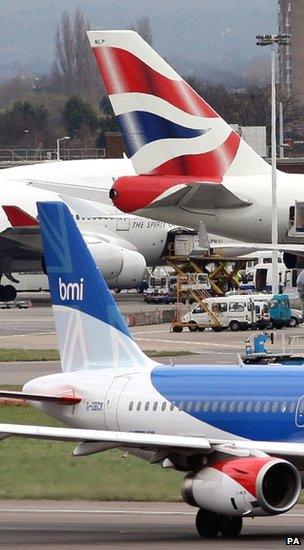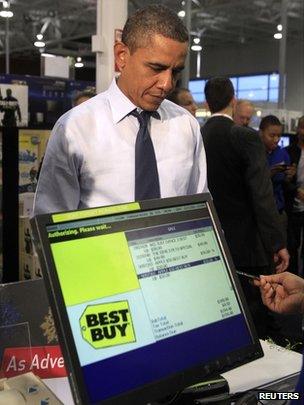US and its airlines: Too much hot air?
- Published
- comments

Airlines will compete on a level playing field under the EU regulations
There are times when businesses are completely justified in the concerns they raise about moves to regulate greenhouse gas emissions.
And there are times when they're not.
The moves by airlines to block EU plans to include international aviation in its Emission Trading Scheme (ETS), external would appear to fall firmly into the second camp.
On Wednesday, a suit brought by Continental and other airlines in the European Court of Justice trying to annul the inclusion was dismissed.
As things stand, therefore, flights beginning or ending in the EU will have their emissions accounted for, commencing on 1 January.
The cost will be minimal. So long as airlines file the appropriate paperwork, they'll be given 85% of their carbon allowance for free.
The costs will rise if they emit more carbon than their allowance covers. If they do, they'll have to buy permits at whatever the market rate is - and this year it's been the lowest since the ETS began, hovering around 7 euros per tonne.
Airlines will pass any extra costs onto passengers. The EU estimates these will be minimal, adding maybe $30 to a return flight to a return flight to or from North America.
The presumption is that this will be something of a disincentive to travel, because that's part of the point of carbon trading - to reduce activities that release carbon dioxide, so lowering emissions.
The other point is to encourage industries to become more frugal with the fuel they burn - and if they do, they can end up actually making money from selling surplus permits.
In terms of competitiveness, the measure doesn't discriminate between airlines on the basis of their nationality. Continental competes on an equal footing to British Airways and Air France; if it can be more economical on fuel than them, it'll make money.
So to claim, as some airlines have, that this will have a huge impact on their custom or their profitability surely strains credulity.
I just called up internet fares for an economy return from London to New York.
In April, the cheapest flight I can get a flight for £449. But if I want, I can pay £1,765.
If I want to go in August, the cheapest fare is £740.

Barack Obama came to power pledging "global leadership" on climate, but has delivered little
The differences between these fares are far, far greater than any estimate for additional costs relating to the ETS. Yet they're all fares that commercial airlines are happy to offer.
The airlines have received some support from governments outside the EU.
Just last week, US Secretary of State Hillary Clinton and Transportation Secretary Ray LaHood sent a letter, external to the EU arguing that the unilateral inclusion of international aviation was "inconsistent" with international law, and saying the US would respond with "appropriate action".
The post-11th hour nature of these protestations has been condemned, external by a number of green campaign groups.
"The Administration's decision to send the December 16 letter on the eve of the Court's decision risks tarnishing America's reputation as a nation that respects the role of independent judiciaries," they write.
"We are troubled, as well, that the Administration is now actively thwarting other countries' efforts to effectively and efficiently reduce greenhouse gas emissions and make good on their own international commitments to avoid a dangerous rise in global average temperatures."
The other aspect of the US position that has drawn cries of "hypocrite" from the environmental community is that it asks the EU to stand down its ETS plan and instead develop a truly global measure to tackle aviation emissions.
Moves to do that have been in play for 14 years, and have resulted in nothing to cap the emission rise. Had the US moved its every diplomatic sinew to introduce a global instrument, one senses it would have been in place by now.
Airlines are pointing out - correctly - that they are making their operations more efficient.
But that's happening at around 1% per year - not enough to prevent overall emissions from the expanding industry from rising.
Some commentators predict that the ETS move will result in a trade war, with the US, China, India and many other countries punishing the EU.
Far more likely, I think, that airlines will find they have a lot more to lose by missing out on the lucrative EU aviation market than by charging customers a few more euros.
If governments are serious about tackling climate change, international aviation emissions have to be curbed at some point.
The EU is so far the only political entity that has shown any determination to match words with deeds.
With President Obama having come to power pledging "global leadership" on climate change, external, one might think his administration would be impressed.